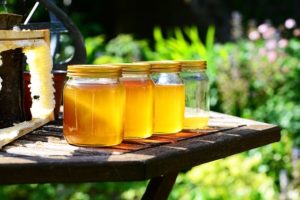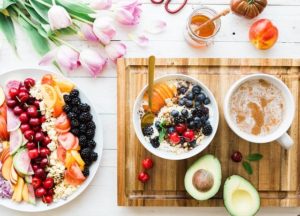I’m a Honey Fan
I am often asked about honey—if it’s healthier than sugar.
Honey does contain sugar. Per tablespoon, honey has 64 calories and 17g of sugar. That being the case, it will cause blood sugar to levels to increase. Good to be aware of, especially if diabetes is present.
Note: the American Heart Association’s Daily Added Sugar limit is 25 grams for women (about 6 teaspoons) and 36 grams for men (about 9 teaspoons). Added sugars are any form of sugar added to food. Honey counts as added sugar. Sorry.
Here’s the happy news: If you’re using a sweetener, honey is a better choice than sugar or high fructose corn syrup. It is still to be consumed in moderation. 
Commercial honey is typically pasteurized and comes from a blend of floral sources and has a mild taste and pale color. It’s the product we usually see on store shelves. The honey has been filtered and is very clear.
Pasteurized honey has been heated in order to destroy potential bacteria or yeasts. Unfortunately, the pasteurization process also destroys enzymes, trace nutrients, and antioxidants found naturally in honey.
In order to enjoy honey’s natural health benefits, look for raw or unpasteurized. Local raw honey (Any raw honey that is harvested nearby where the same sort of plants are blooming at roughly the same time can be considered local.) is beneficial for pollen allergies, has some healing properties (may help with sore throats, stomach flu), and has antiseptic properties when applied to wounds, burns, and other skin conditions.
Young kids are more prone to acute coughs because they’re still developing their immune systems. If your two-year-old develops a cough, give them honey. Mix a teaspoon or two into warm water and give it to your child to drink daily until the cough has gone away. Children under the age of 2 should not consume honey, as there could be bacteria present that could make them sick.
Some of you may be advocates of Manuka honey, a type of honey native to New Zealand. Its antibacterial properties are what set it apart from traditional honey. Manuka honey has been known to help treat a variety of ailments. 
I’m a honey fan. A drizzle over my plain Greek yogurt along with summer peaches is a delicious breakfast or snack.
Cheers to a bit of honey, the coming of summer, and “The Secret Life of Bees.”
Much love,
Carol
“We lived for honey. We swallowed a spoonful in the morning to wake us up and one at night to put us to sleep. We took it with every meal to calm the mind, give us stamina, and prevent fatal disease. We swabbed ourselves in it to disinfect cuts or heal chapped lips. It went in our baths, our skin cream, our raspberry tea and biscuits. Nothing was safe from honey…honey was the ambrosia of the gods and the shampoo of the goddesses.” ― Sue Monk Kidd, The Secret Life of Bees


